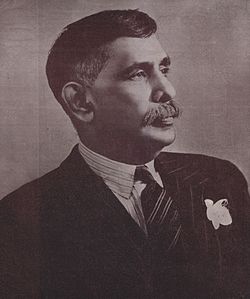- Top left: D. S. Senanayake became the first Prime Minister of Ceylon in 1947.
- Top right: Sirimavo Bandaranaike was the first female Prime Minister of Ceylon and its longest-serving prime minister, holding office for over 17 years across three separate terms.
- Bottom left: Ranasinghe Premadasa was the longest-serving prime minister without interruption, holding office for over 10 years from 1978 to 1989.
- Bottom right: Ranil Wickremesinghe has served as prime minister on four separate occasions and has been sworn in six times, the most of any Sri Lankan prime minister.
 |
|---|
There have been sixteen prime ministers of Sri Lanka since the creation of the position in 1947, prior to the independence of the country (then known as Ceylon). The prime minister of Ceylon was the head of the government until 1972. In 1972, the country was renamed as the Free, Sovereign and Independent Republic of Sri Lanka, and the position was known as the prime minister of Sri Lanka from then onwards. The prime minister also held the unified Ministry of External Affairs and Defence until 1977, when the government of J. R. Jayewardene split the ministry into two ministries, forming the Ministry of Defence and the Ministry of Foreign Affairs.
Contents
- List of prime ministers
- List of prime ministers by length of term
- Timeline
- Relations between prime ministers
- Living prime ministers
- See also
- Notes
- References
In 1978, after Jayewardene became the president, new constitutional changes were introduced. The position of the executive president was introduced, resulting in the powers of the prime minister being reduced. The president became the head of state and chief executive, [1] and the prime minister became a weak head of government. [2]
Under the current constitution of Sri Lanka, the prime minister is the leader of the Cabinet business and also functions as a deputy to the president. In the event a president dies in office, the prime minister becomes the acting president until the Parliament convenes to elect a successor or new elections can be held to elect a new president. Such was the case in 1993, when President Ranasinghe Premadasa was assassinated and Prime Minister Dingiri Banda Wijetunga took office as president. [3]
On 28 April 2015, the Parliament approved the 19th Amendment to the Constitution of Sri Lanka which gives the power of the government to the prime minister, while the president remains the head of state, head of the Cabinet, and commander-in-chief. [4]
Of the sixteen prime ministers who have held the office since the introduction of the position in 1947, one has held the office four times, two have held office thrice, and two have held office twice. Six prime ministers have gone on to become president of the country. [5]
Ranil Wickremesinghe has been sworn in as prime minister the most times in the country's history, on six occasions (May 1993, December 2001, January 2015, August 2015, December 2018 and May 2022), [6] [7] whilst Dudley Senanayake and Sirimavo Bandaranayake have each been appointed three times. Mahinda Rajapaksa is the only prime minister who was suspended from his duties by the Supreme Court, [8] [9] [10] becoming the first and only de facto prime minister of Sri Lanka in 2018.




















